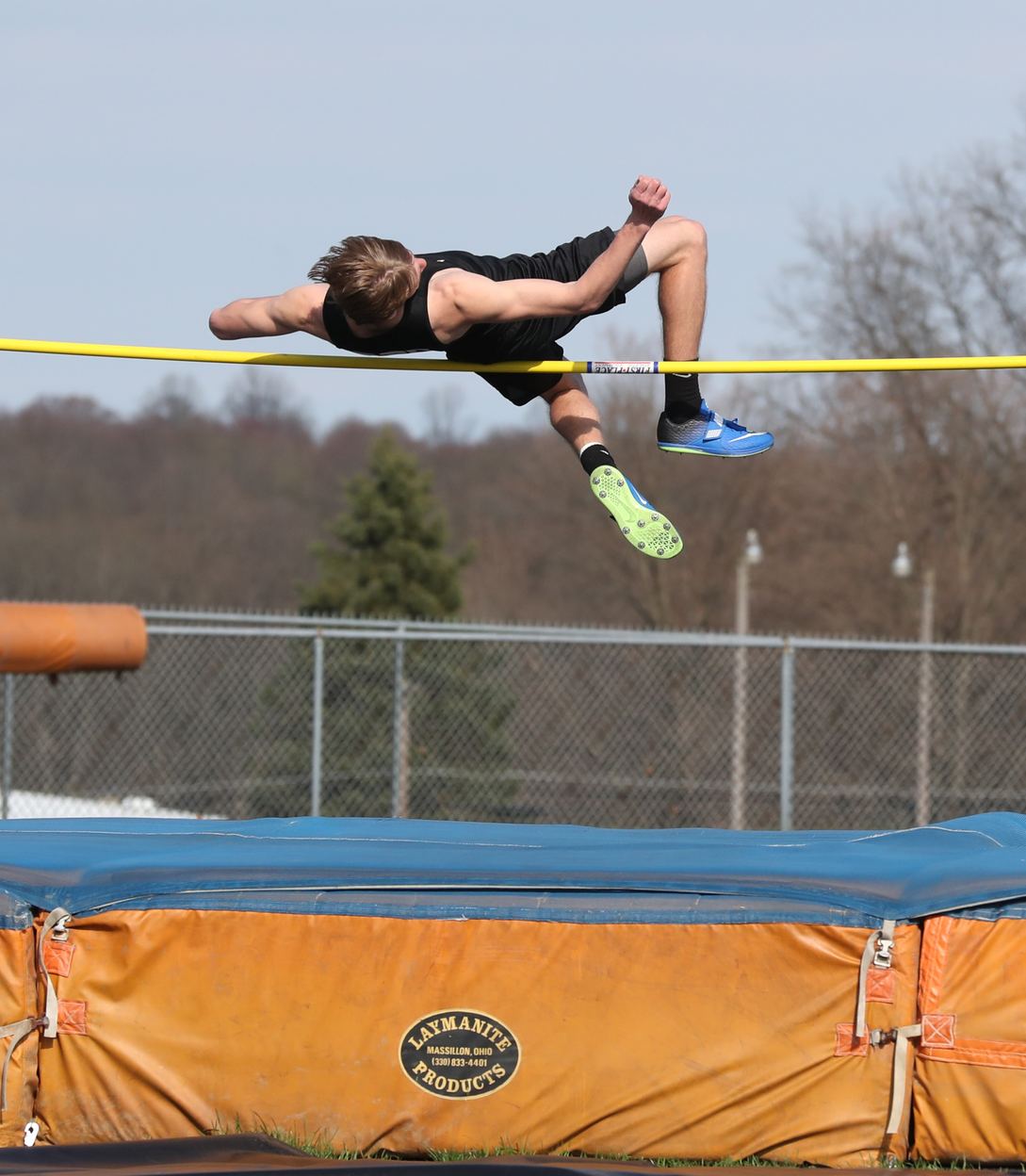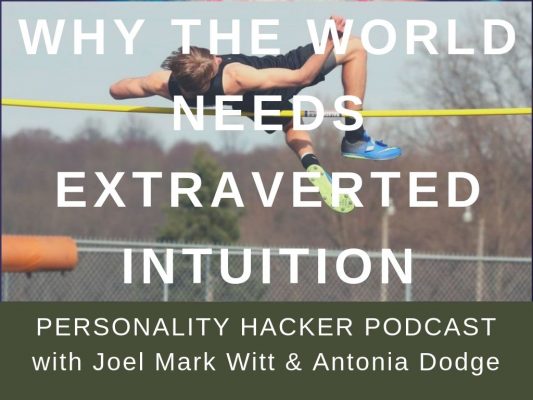Download Episode Here – right click link and select “Save Link As…”
In this episode, Joel and Antonia become advocates for the cognitive function of Extraverted Intuition (“Exploration”) and talk about why we need it in our world.
In this podcast you’ll find:
To subscribe to the podcast, please use the links below:
Subscribe with iTunes
Non-iTunes Link
Soundcloud
Stitcher
Google Play
Spotify
Radio Public
PlayerFM
Listen Notes
If you like the podcast and want to help us out in return, please leave an honest rating and review on iTunes by clicking here. It will help the show and its ranking in iTunes immensely! We would be eternally grateful!
Want to learn more?
Discover Your Personal Genius
We want to hear from you. Leave your comments below…



Share:
Podcast - Episode 0283 - Why The World Needs Extraverted Sensing
Podcast - Episode 0285 - Enneagram Myths Part 1 - The Body Center Types 8 - 9 - 1 (with Beatrice Chestnut)
7 comments
I really enjoyed this podcast – thank you!
I’m an INFP and I’ve had a complicated relationship on a personal level with my own extraverted intuition. In childhood, it was absolutely suppressed as I grew up in a very chaotic, turbulent environment where I didn’t feel any sense of safety and there was a lot of emotional conflict. (I also identify as an enneagram 4 self preservation). So I can see that I relied heavily on introverted feeling and introverted sensing to manage the emotions of those around me and to operate “strategies” to feel safe – learn not to do anything that would upset my parents. I became hyper vigilant to my own behaviour – which pretty much pours water on the fire of exploration. There was very little encouragement or opportunity to explore, to have adventures, to play, or to investigate new ideas.
In my 20s I felt the pull of my extraverted intuition very strongly and remember feeling incredibly and extraordinarily frustrated constantly (I was on anti-anxiety meds for years to try and quell the ‘crackle’ I felt inside me). In reality what happened is I got into a lot of debt through compulsive spending on the next new shiny object, new gadget, new experience, new educational course. I craved newness but I was doing exactly what you described in the podcast – I was seeking to satisfy that with consumption. I can see now that this was me trying to satisfy two core motivations – one for newness and adventure and the other conflicting motivation of needing to feel safe (and I really didn’t) – because although unsatisfying – the consumption felt safer than genuine exploration as it didn’t affect the outside world (no one new what I was doing) and it didn’t upset anyone or rock any boats.
Applying that to society at large, I think we live in a very frightening time and chasing new shiny objects is a great (temporary) distraction from fear. But it always wears off so we always chase the next new thing. Hence the ‘cult of novelty’. Maybe as a culture we are afraid to truly explore because we know deep down that means going to some difficult places and we are afraid we’re not up to the challenge. So I think that’s where truly healthy extraverted intuition is needed. My Ne is fearless and hugely optimistic for a better outcome/future but my Si is always fearful and convinced that the bad things that happened in the past will happen again – so it’s a balance between the two, I think.
I have a much healthier relationship with Ne now (and am out of debt – yay!) – all of those ill-advised adventures have at least left me with a lot of qualifications and degrees (not sure I needed this many but there we go) so it wasn’t all bad.
I know my Ne used to annoy my INTJ a lot and he found it quite overwhelming for a long time – I would have all these ideas about things I wanted us to do and he would feel like he had to implement all of them. So he would get quite angry and try and get me to be as focused and single-minded as him (which is about as likely to succeed as asking a cat not to run around the house like a lunatic at 3am – they’ve just got to!) I think there is an element of that in society too. There are a lot of new ideas that don’t last and aren’t sustainable so I think there’s an element of novelty exhaustion as well where we expect 90% of things to fail (and maybe they do). There’s a lot of wastage with Ne as you say. And people get annoyed when they plough resource into things that don’t pan out. On a personal level, my INTJ has learned to wait – effectively to let me play with ideas – and then if one sticks for longer than a month, we’ll talk about it more seriously. I think society could benefit from that but there seems to be an aversion to ‘play’ – like it’s inefficient and wasteful and frivolous. I mean, look at the way we raise children – they’re being scored, assessed, and taking exams almost from the get go. I didn’t know this was where I was going to end up in this comment but I think a key point is re-evaluating our culture’s relationship to play AKA exploration. It’s absolutely vital to society at an individual and wider level but we do seem to frown upon it.
Anyway, if you read all of this rambling – thanks! Love your Podcast. Thank you.
As an ENFP, I’ve been eagerly awaiting this podcast, and was super happy to listen to it.
I think the greatest gift Ne can give the world is it’s ability to remain open-minded and consider other patterns and options. Because of Ne’s curiosity, NPs can extremely open and accepting of others’ choices and ideas. Now, other types can be accepting and open-minded and every NP has a place where they will morally draw a line in the sand. And this can vary from person to person.
I do think the Ne that society seems to crave often lacks that ability to hold space and is too quick to have value judgements attached. In reality, knee-jerk value judgments with no consideration of the various outside factors really isn’t what healthy Ne is about. So, in a way, even though society seems to crave novelty and Ne, it doesn’t do Ne justice when certain scenarios happen. For instance, when someone thinks “Oh I disagree with you on this thing, so I’m going to discount everything you have to say and deem you to be a terrible person.” Sometimes, backlash and call outs are warranted. And some ideas as horrific (like if someone advocates for genocide or human rights abuses). Plus, I believe nothing is above criticism. Though, there seems to be a negativity bandwagon people jump on extremely quickly without taking time to examine the evidence and the possibilities. I think this is sometimes why NPs will play “devil’s advocate” because they are trying to get others to consider what they are considering as well.
I grew up fairly close to Gettysburg, PA where of course a major Civil War Battle was fought in 1863 (for anyone unfamiliar with the American Civil War). So, it was a destination everyone went on field trips too at some point. More than a decade ago, in the 00’s, I was an elementary school student. My class and I took a field trip to the battlefield and we walked the route of Pickett’s Charge. It was sort of like a very tame, low key historical re-enactment and was a good way to sort of contextualize the actual event. The thing is, this would probably be completely seen as taboo nowadays because we were a bunch of mostly white fifth graders walking around a field with a large Confederate battle flag. In 2019, this seems like something that would get pounded on for being racist when there were no racist intentions. It was to add a little more realism to the experience. It would also be ridiculous to peg me or any of my former peers as racist for this, but I feel like without considering the context it could be. But, Ne can pattern recognize its way to understanding the possible contexts of the situation, the time period in which this took place, and how the flag was being used (basically as a tool for historical reenactment).
And a lot of people have seemingly shady things like this in their past that could be interpreted as subscribing to a certain paradigm when they weren’t. Or maybe they did and have since made an earnest effort to change. Not everyone grows up in a “woke” context or is aware of why something might be problematic. Heck, for Halloween one year, I dressed up in what was advertised as a “Native American dress.” Is that cultural appropriation? Probably (it was definitely over generalized). Would I do that today? No. But we need to take factors into consideration such as the fact that I was literally 9, had never heard the concept of cultural appropriation, I’d wager a large majority of the mostly white conservative community I was raised in had never heard of it either, and my intention was not to mock anyone or deride other cultures. So, taking those factors into account. Should I be shunned by society? I’d say no. It was ethically dubious unintentionally and not reflective of the broader worldview I have as an adult. This is the kind of thing Ne can be really good at spotting and discerning when observing it from the outside. And that’s so important to have in a cultural context that changes as rapidly as ours does today.
Obviously, Ne isn’t always going to be spot on when forming patterns. And I can see why people who don’t have strong and well-developed Ne could have trouble coming up with connections such as these on their feet and in the heat of the moment. But Ne’s polarity of Si helps build skill in Ne because it can recall past experiences so we can have that to inform us to possible options. And when Si is really well incorporated into Ne, the patterns Ne forms will have a higher chance of hitting the mark.
And I mean I probably am guilty of putting Ne on a pedestal. But I also find it to be such an asset when navigating nuances and complexities. I once said to some friends that the biggest problem with our world today is the “lack of nuance.” Ne can seem random and silly and probably annoys the heck out of some people, and it can be at times, but I think it has the power to bring the world something it truly needs.
Also, I sometimes think the over the top random imagery in advertising is made by a bunch of NPs playing on how people perceive them to act and think. It seems like something that would definitely come out of a board meeting filled with NPs.